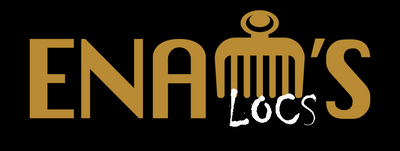Dreadlocks and Hair Loss: Addressing Your Concerns
Dreadlocks have been a popular hairstyle for centuries, worn by people from various cultures around the world. But if you're considering getting locs or already have them, you might be wondering: do dreadlocks cause increased hair loss? As a professional loctician I'm here to unravel this mystery and provide you with the facts.
The Complex Answer: Yes and No

When it comes to dreadlocks and hair loss, there's no simple yes or no answer. The truth lies somewhere in the middle, and it largely depends on how your dreadlocks are installed and maintained. Let's dive deeper into this topic to understand when dreadlocks can be a friend to your hair, and when they might become a foe.
When Dreadlocks Don't Cause Hair Loss
Contrary to popular belief, properly installed and maintained dreadlocks can actually be beneficial for your hair. Here's why:
-
Reduced Manipulation: Once your hair is locked, you're not constantly combing, brushing, or styling it. This significant reduction in daily manipulation can decrease breakage and minimize stress on your hair strands.
-
Protection from Environmental Factors: Locs can act as a protective style, shielding your hair from environmental stressors like harsh weather conditions, pollution, and even the friction from your pillowcase as you sleep.
-
Natural Growth Promotion: With less manipulation, your hair is free to grow naturally. Many people find that their hair retains length better when in locs, as the ends are protected within the lock structure.
-
Scalp Health: Well-maintained locs can promote a healthy scalp environment. When your scalp is clean and your locs are properly spaced, it allows for good air circulation, which is crucial for scalp health.
The key phrase here is "properly installed and maintained." When dreadlocks are started and cared for correctly, they distribute weight evenly across your scalp, preventing unnecessary stress on any particular area.
When Dreadlocks Can Lead to Hair Loss
Now, let's address the elephant in the room. Yes, dreadlocks can potentially contribute to hair loss under certain circumstances:

-
Traction Alopecia: This is the most common type of hair loss associated with locs. It occurs when there's constant pulling on the hair follicles. Factors that can lead to traction alopecia include:
- Locs that are too heavy
- Poor sectioning, especially sections that are too small
- Tight styling, like frequently wearing high ponytails or buns
- Excessive retwisting, particularly at the roots
-
Neglect and Poor Maintenance: Failing to properly care for your locs can lead to issues like:
- Buildup of products, dirt, and oils
- Matting and tangling at the roots
- Breakage due to dryness or over-manipulation
-
Improper Starting Methods: Some methods of starting locs, like using wax or other heavy products, can suffocate the hair and scalp, potentially leading to follicle damage and hair loss.
-
Chemical Damage: Using harsh chemicals to dye or treat your locs can weaken the hair, leading to breakage and loss.
Remember, your hair follicles are living things. When they're consistently under stress or not properly cared for, they can become damaged, potentially leading to hair loss.
Understanding Hair Loss During Dreadlock Removal
Here's an interesting fact that might surprise you: on average, a person naturally sheds about 50-100 hairs per day. When your hair is in locs, these shed hairs often get trapped within the dreadlock instead of falling out.
So, when you eventually take down your locs, you might see a significant amount of loose hair and think, "Oh no, my dreadlocks caused all this hair loss!" But don't panic! What you're seeing is likely the accumulation of your normal hair shedding over the entire time you've had your locs. It's not necessarily increased hair loss caused by the locs themselves.
Potential Effects of Loc Extensions
Loc extensions can be a great way to add length or fullness to your locs, but they come with their own set of considerations:
-
Added Weight: Extensions add extra weight to your natural hair. If they're too heavy, they can cause the same issues as overly heavy natural locs.
-
Installation Technique: The method used to attach extensions can impact your hair health. Techniques that cause too much tension can lead to breakage or traction alopecia.
-
Length Matters: While super long extensions might look amazing, they put more strain on your hair and scalp due to their weight.
-
Maintenance Challenges: Extensions require proper care to prevent matting or buildup where they attach to your natural hair.
If you're considering loc extensions, it's crucial to consult with a professional loctician who can guide you on the right weight, length, and installation method for your hair type and desired style.
Preventing Hair Loss with Dreadlocks
Now that we understand the potential risks, let's talk about how to maintain healthy locs without compromising your hair's well-being. Here are some pro tips:
Proper Sectioning
The foundation of healthy locs starts with proper sectioning. Here's what you need to know:
- Sections should be uniform in size and shape for even weight distribution.
- The size of your sections should be based on your hair density and desired loc thickness.
- Avoid sections that are too small, as these can lead to weak locs and increased scalp tension.
Choosing the Right Type of Dreadlocks
Not all locs are created equal. Consider these factors when choosing your loc style:
- For fine or thinning hair, opt for smaller, lighter locs to reduce stress on the hair follicles.
- If you have thick, coarse hair, you can go for chunkier locs without risking too much tension.
- Synthetic locs can be a good option if you want to give your natural hair a break, but ensure they're not too heavy.
Hair and Scalp Care
Healthy locs start with a healthy scalp. Follow these tips for optimal loc care:
- Keep your scalp clean and moisturized. Use a residue-free shampoo and light, natural oils.
- Avoid tight styles, especially around your hairline where hair is typically more fragile.
- Give your locs a break from styles that pull on your scalp.
- Stay hydrated and maintain a balanced diet rich in hair-healthy nutrients like biotin, iron, and vitamins A and C.
- Protect your locs while you sleep by using a satin or silk pillowcase or headwrap.
Maintenance Best Practices
- Retwist your locs regularly, but not too frequently. Every 4-6 weeks is typically sufficient for most people.
- When retwisting, avoid pulling too tightly, especially at the roots.
- Use lightweight, natural products to avoid buildup.
- Consider incorporating a professional deep cleaning session every few months to remove any accumulated buildup.
Conclusion
So, do dreadlocks cause increased hair loss? The answer isn't a simple yes or no. When installed and maintained correctly, dreadlocks can be a beautiful, low-manipulation style that promotes hair health and growth. The key is to prioritize the health of your hair and scalp throughout your loc journey.
Remember, every head of hair is unique. What works for one person might not work for another. Listen to your hair, pay attention to how it responds to your loc care routine, and don't hesitate to consult with a professional loctician if you have concerns.
Embrace your locs, care for them properly, and rock your style with confidence. With the right approach, you can enjoy the beauty of dreadlocks while maintaining the health of your hair and scalp.
FAQ
Q1: Can I prevent hair loss while wearing dreadlocks? A: Absolutely! Proper installation, regular maintenance, and avoiding tight styles can significantly reduce the risk of hair loss associated with dreadlocks.
Q2: How often should I maintain my dreadlocks to prevent hair loss? A: It depends on your hair type and loc style, but generally, a maintenance session every 4-6 weeks is sufficient. Over-maintenance can actually lead to more stress on your hair.
Q3: Are some hair types more prone to hair loss with dreadlocks? A: While any hair type can experience loc-related hair loss if not cared for properly, finer hair types might be more susceptible to traction alopecia due to the added weight of the locs.
Q4: Can I reverse hair loss caused by dreadlocks? A: If caught early, traction alopecia can often be reversed by removing the source of tension and allowing the hair to recover. In severe cases, you may need to consult a trichologist or dermatologist for treatment options.
Q5: Are starter locs more likely to cause hair loss than mature locs? A: Starter locs can be more prone to causing tension if not installed correctly. However, with proper installation and care, they shouldn't cause more hair loss than mature locs. The key is gentle handling during the early stages of your loc journey.


Leave a comment